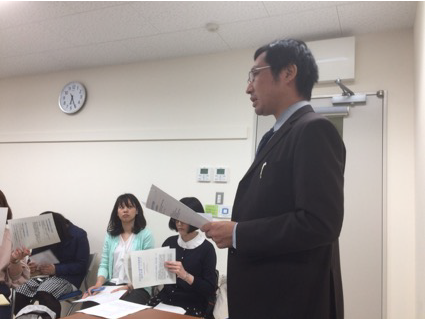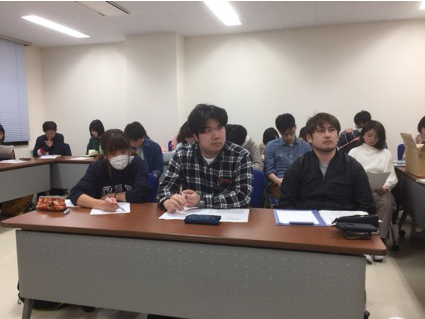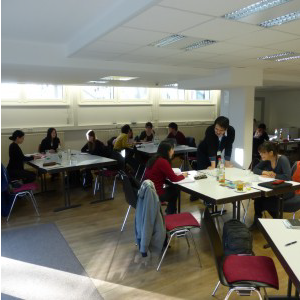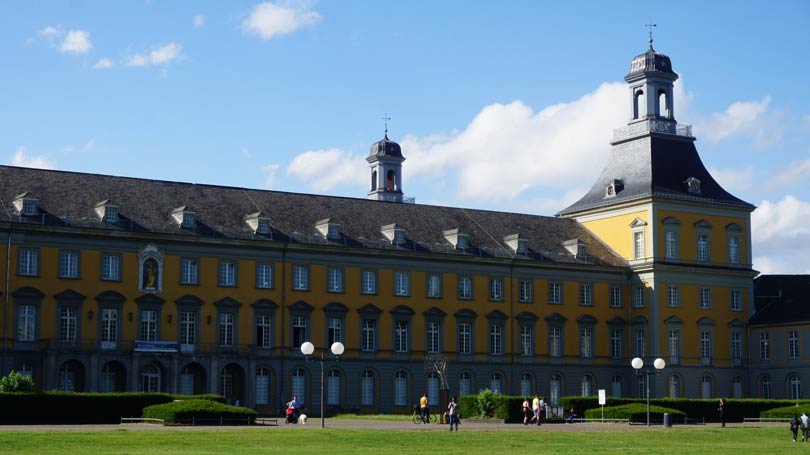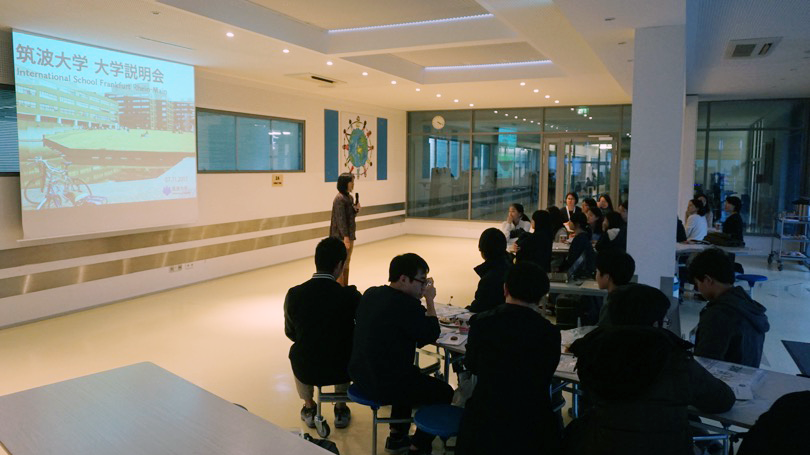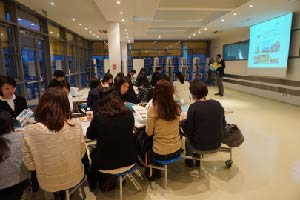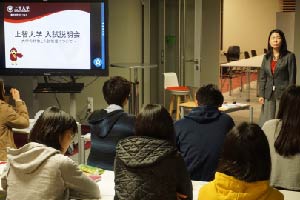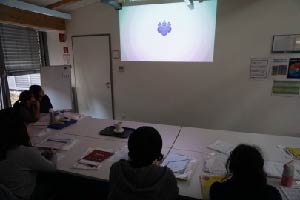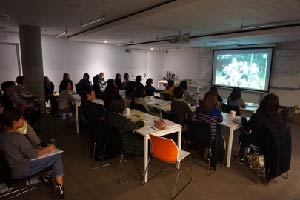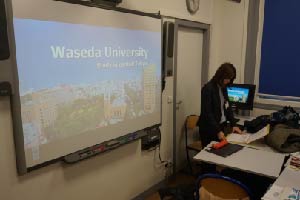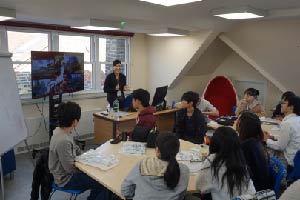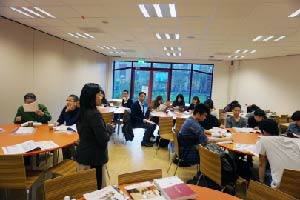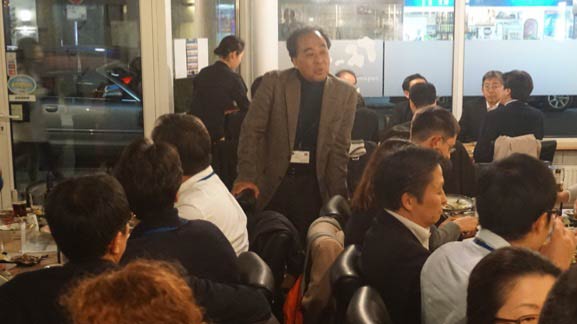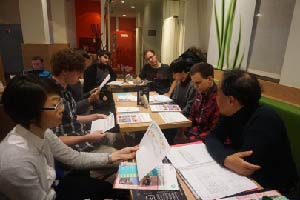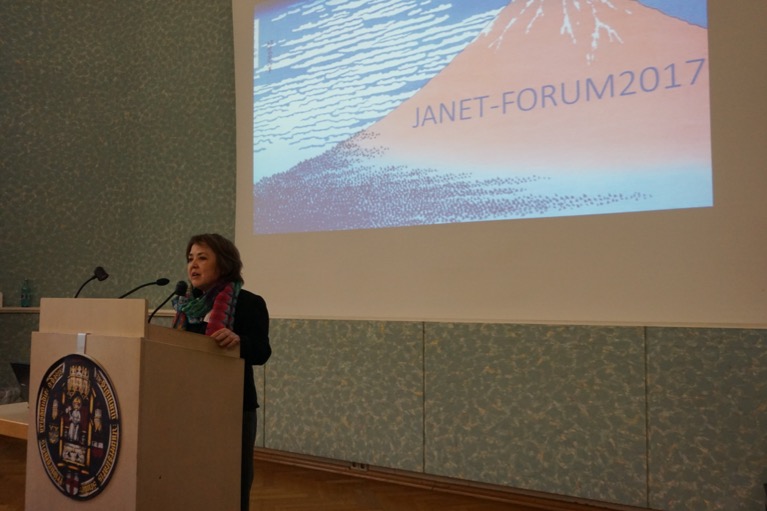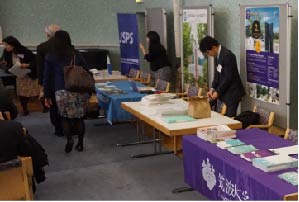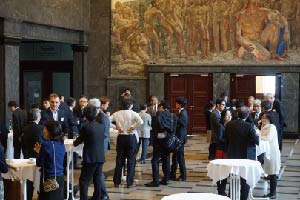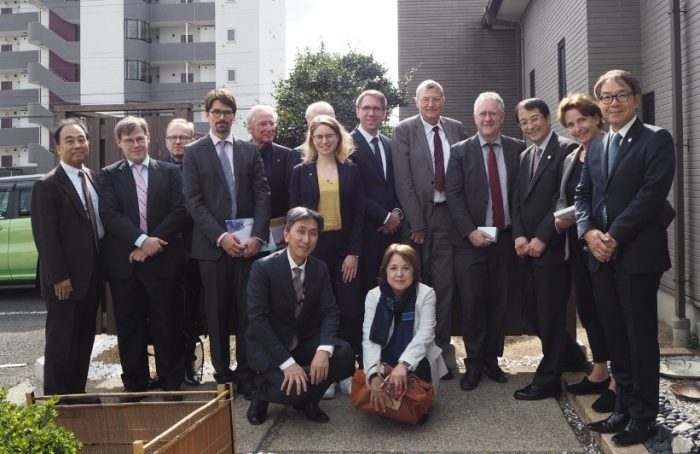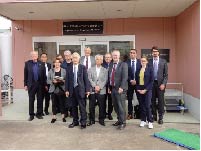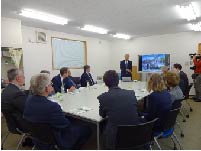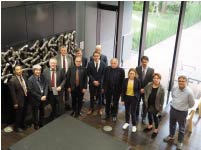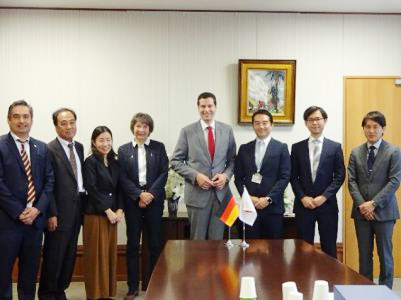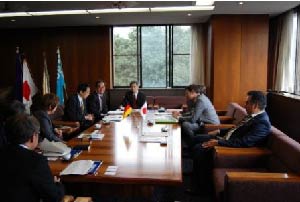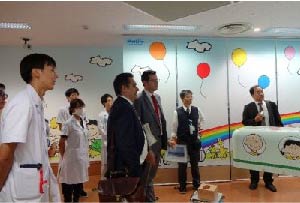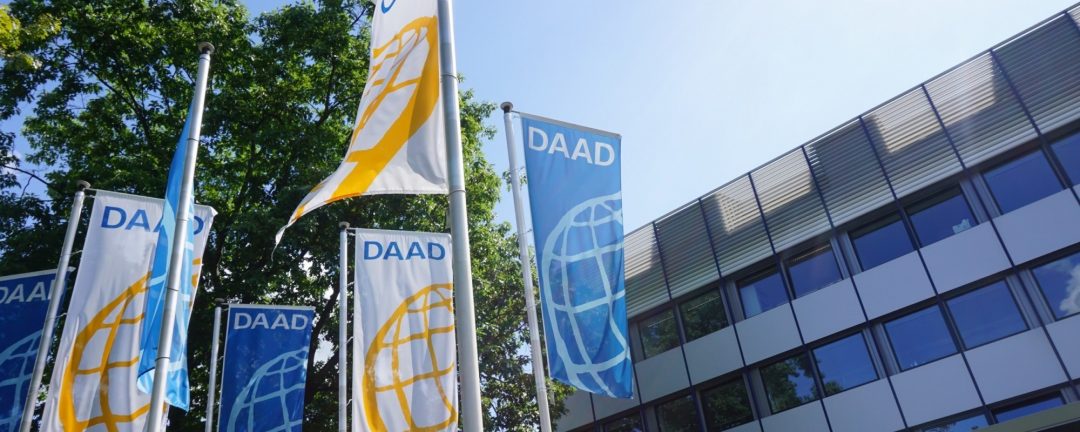
Outline
The program was established on the joint initiative of the German Academic Exchange Service (DAAD) and the University of Tsukuba. It aims to support personnel exchange at excellent research done at University of Tsukuba and at German universities and research institutes. Through this program, the University of Tsukuba wants to promote its long-term cooperation with German educational and research institution, create new partnerships and reinforce existing ones.
Applications for the University of Tsukuba-DAAD Partnership Program for FY2022 are now open.
For details, please refer to the Staff and Faculty website of the University of Tsukuba or the following application guidelines.
The Japanese representative applying for this program must submit to the University of Tsukuba, and the German representative must apply to DAAD via the DAAD portal.
Please make sure that the application plans of both parties match.
Application Guideline Tsukuba DAAD Partnership programme2022-2023
Form1_Abstract(Tsukuba-DAAD )2022_日独共通レジュメ
Form2_Tsukuba-DAAD Application Form_R4
Form3_Project description_日独共通レジュメ
Form4_Project planning overview_日独共通レジュメ
Guide to Results-oriented Project Planning and Monitoring (RoM)
Schedule
NovemberJoint examination of DAAD and University of Tsukuba
| 24. August | Call for applications |
| 1. October | Entry deadline Different from German deadline |
| January | Notification of results |
*Please note that this schedule is subject to changes in some years.
FAQ
| Category | Number | Question | Answer |
|---|---|---|---|
Application
|
1 | Do the researchers need to submit documents in both Germany and Japan at the time of the application? | Yes.
Applicants from the University of Tsukuba have to submit their application forms to the academic service office of the University of Tsukuba, whilst German applicants have to submit the respective documents to the DAAD. If just one of the two applications is not carried out, the project will not be eligible for the review. |
| 2 | In which language should I write the documents? | Usable languages are, in the Japanese application Japanese or English, in the German application German or English. In one part of the Japanese application forms there will be entries required that need to be filled out side by side in Japanese and English (or Japanese and German). So please carefully confirm the instructions of the language specifications and only then fill the form in. In any case, please turn in a collaboratively written English resume to both sides, University of Tsukuba and the DAAD respectively. | |
| 3 | Are applicants, which have been selected for this program in the past, able to apply again in the coming academic year? | Yes.
However, to make sure that this programme is aiding early-stage research, it is demanded that, in case of projects that have been selected in the past and re-applications with the same research topic, documents explaining the results of one’s research are to be submitted together with the application form, while explaining why the same research has to be continued. |
|
| 4 | Please tell me about the amount of money for which one can apply. | In the first year of the project, funds reaching a maximum of €15,000 on the German side and a maximum of ¥1,500,000 on the side of University of Tsukuba, are offered. It is not possible to apply for funding exceeding this limit. The amount of money for the second year will be below half of the amount chosen for the first year. | |
| 5 | Are researchers from other Japanese Universities or research facilities apart from the University of Tsukuba able to take part in projects chosen for this programme? | Yes.
Even researchers not affiliated with the University of Tsukuba are able to partake as members of the projects. However, because extramural researchers can’t receive funding offers from this programme, we have to ask you to compensate for travel expenses to conduct cooperative research with the German partner by using resources of the affiliated institution or own expenses. |
|
| 6 | If researchers enrolled at the University of Tsukuba as “Research Fellowship” (特別研究員) partake at the project, are they eligible for supplementation of the travel expenses and such? | Yes.
“Postdoctoral Fellow” (博士特別研究員) of this university are eligible to receive grants. Moreover, in this program, persons who enroll in this university and who acquired grant-in-aid from outside the university (e.g. Research Fellowship of the JSPS or Visiting Foreign Research Fellow etc.) can also be granted the travel expenses, but regarding the permission of business trips as well as the acceptance of their travel expenses, check the rules of the supporting institution and follow those instructions accordingly (depending on the regulations of the supporting institution, only actual travel expenses (and no full daily allowances) may be accepted, and it could be necessary to report overseas travel to the supporting institution). |
|
Election
|
7 | Could it happen that an applied project could only be accepted on the German or the Japanese side? | No.
There has been no case when an applied project has been accepted on only one side of the two countries. Japanese-German applications are always chosen in a set. |
| 8 | By which criteria are selected projects elected? | The applying projects are evaluated by the following criteria and SMART criteria* (Specific, Measurable, Attainable, Relevant and Time-bound). See ”Guide to Results-oriented Project Planning and Monitoring (RoM)” :
Additional requirements for research teams who are applying for funding extension, i.e. continued cooperation funding beyond two years:
The screening on the German side is held by the same criteria. The elected projects are decided through the negotiations of a Japanese-German committee. If there is a lack of persuasiveness in why it is necessary to undergo a Japanese-German collaborative research, or if the planned number of young researchers taking part is too low (etc.), your rating could be lowered. |
|
| 9 | When are the funds for the selected project distributed? | At first, from the middle of April to around May, the budget for the Office of Global Initiative is distributed from the Department of Finance and Accounting. At the middle of May the designated part of it will be redistributed from the Office of Global Initiatives to the affiliated bureau of the applicant. Regarding the paperwork in case of using the distributed funds for business trips, please get in contact with the one in charge of the finances of the affiliated bureau. | |
| 10 | Can I learn about the previously selected projects? | Yes.
A summary of the projects selected in the past and the related project reports are listed below. Please send an E-Mail to the Bonn Office, if you need further information. |
|
| Subject Change | 11 | What kind of procedures are required, if a representative of the project has to transfer from the University of Tsukuba? | If a representative of the project is leaving the University of Tsukuba, it is necessary to choose another researcher from the University of Tsukuba. If no new representative is nominated, the project will be interrupted, so please take care. Please perform the change of a representative by using the application form on this website [Project Modification]. |
| 12 | What kind of procedures are required, if the participants on the side of the University of Tsukuba or the period of the stay in Germany changes? | If the project participants or the period of the stay in Germany change, a detailed notification is required. Please perform the change of the project contents by using the application form on this website [Project Modification]. | |
| Report | 13 | What kinds of procedures are required after the end of the stay in Germany of this programme? | At the end of each trip to Germany using the program budget, an [Expense Report] must be submitted.
In addition, a [Final Report] is expected to be submitted annually by the end of March. |
過去の採択課題
| 平成26年度 | ||
| 1 | 課題名 | 量子ビームを用いた高効率太陽電池の研究 |
| 代表者 | 筑波大学側:上殿明良 教授(数理物質系)
ドイツ側:Prof. Dr. Roland Scheer(ハレ大学) |
|
| 2 | 課題名 | 次世代がん粒子線治療の確立に向けた国際比較 |
| 代表者 | 筑波大学側:櫻井英幸 教授(医学医療系)
ドイツ側:Prof. Dr. Wolfgang Sauerwein(デュースブルク-エッセン大学) |
|
| 3 | 課題名 | 六脚類(広義の昆虫類)のグラウンドプラン、高次系統の再構築
-比較発生学、形態学とファイロゲノミクスの統合- |
| 代表者 | 筑波大学側:町田龍一郎 教授(生命環境系)
ドイツ側:Prof. Dr. Rolf Beutel(イエナ大学) |
|
| 4 | 課題名 | 日独通訳・翻訳をめぐる専門用語辞典編集と等価表現研究(2) |
| 代表者 | 筑波大学側:相澤啓一 教授(人文社会系)
ドイツ側:Dr. Asa-Bettina Wuthenow(ハイデルベルク大学) |
|
| 平成27年度 | ||
| 1 | 課題名 | 日本の近代化における伝統の継承と再構築をめぐる日独共同研究 |
| 代表者 | 筑波大学側:平石典子 准教授(人文社会系)
ドイツ側: |
|
| 平成28年度 | ||
| 1 | 課題名 | エネルギー変換や光活性メタマテリアルのための革新的ナノ材料の開発 |
| 代表者 | 筑波大学側:山本洋平 准教授(数理物質系)
ドイツ側:Dr. Tobias Teckentrup(デュースブルク-エッセン大学) |
|
| 2 | 課題名 | エネルギー政策・言説の日独地域比較 |
| 代表者 | 筑波大学側:タック川﨑レスリー 准教授(人文社会系)
ドイツ側:Prof. Dr. Miranda Schreurs(ベルリン自由大学) |
|
| 3 | 課題名 | マイクロホンアレーを用いた音情景解析の研究 |
| 代表者 | 筑波大学側:牧野昭二 教授(システム情報系)
ドイツ側:Prof. Dr. Walter Kellermann(エアランゲン-ニュルンベルク大学) |
|
| 平成29年度 | ||
| 1 | 課題名 | グリーンテクノロジーのための日本-ドイツ共同研究
– 太陽電池,パワーデバイス及び低消費電力デバイスの研究 – |
| 代表者 | 筑波大学側:上殿明良 教授(数理物質系)
ドイツ側:Prof. Dr. Reinhard Krause-Rehberg(ハレ大学) |
|
| 2 | 課題名 | 革新的双安定性化合物の創成 |
| 代表者 | 筑波大学側:大塩寛紀 教授(数理物質系)
ドイツ側:Prof. Dr. Franz Renz(ハノーファー大学) |
|
| 3 | 課題名 | インクルーシブ教育における特別支援学校の専門機関としての役割と課題
-日本とドイツ・バイエルン州の特徴的な実践をもとに- |
| 代表者 | 筑波大学側:鄭仁豪 教授(人間系)
ドイツ側:Prof. Dr. Annette Leonhardt(ミュンヘン大学) |
|
| 平成30年度 | ||
| 1 | 課題名 | インクルーシブ教育システムの開発:日独の理論的枠組みと実践の比較を中心に |
| 代表者 | 筑波大学側:柿澤 敏文 教授(人間系)
ドイツ側:Prof. Dr. Sven Degenhardt(ハンブルク大学) |
|
| 2 | 課題名 | シアノバクテリアの新規グリコール酸代謝経路の検討 |
| 代表者 | 筑波大学側:鈴木 石根 教授(生命環境系)
ドイツ側:Prof. Dr. Martin Hagemann(ロストック大学) |
|
| 3 | 課題名 | 大規模物質・デバイス設計シミュレーションを目指した第一原理計算コードの開発 |
| 代表者 | 筑波大学側:小野 倫也 准教授(計算科学研究センター)
ドイツ側:Researcher Paul Baumeister(ユーリッヒ研究機構) |
|
| 平成31年度 | ||
| 1 | 課題名 | プラズマと材料表面計測を組み合わせたプラズマ・材料相互作用の理解と制御のための日本-ドイツ共同研究 |
| 代表者 | 筑波大学側:坂本 瑞樹 教授(数理物質系)
ドイツ側:Prof. Dr. Uwe Czarnetzki (ルール大学ボーフム校物理天文学部 ユーリッヒ総合研究機構エネルギー・気候研究所) |
|
| 2 | 課題名 | 視覚系における情報処理と知覚の柔軟性 — 皮質における適応計算の理解に向けて |
| 代表者 | 筑波大学側:酒井宏 教授(システム情報系)
ドイツ側:Dr. Udo Ernst(ブレーメン大学) |
|
| 3 | 課題名 | 欧州とアジアにおける天候レジーム: 季節内スケールの予測可能性(WEASP) |
| 代表者 | 筑波大学側:松枝未遠 助教(計算科学研究センター)
ドイツ側:Dr. Christian Grams(カールスルーエ工科大学) |
|
| 令和元年度 | ||
| 1 | 課題名 | インクルーシブ教育を支える多職種専門家チームとその機能:日独国際比較 の観点から |
| 代表者 | 筑波大学側:宮内久絵 助教(人間系)
ドイツ側:Prof. Dr. Sven Degenhardt(ハンブルク大学) |
|
| 2 | 課題名 | 日本とドイツにおける人工内耳装用児の言語発達を支えるリハビリテーションに関する比較調査研究 |
| 代表者 | 筑波大学側:鄭仁豪 教授(人間系)
ドイツ側:Prof. Dr. Dr. habil. Annette Leonhardt(ルードヴィヒ・マクシミリアン大学ミュンヘン) |
|
| 3 | 課題名 | 和周波発生分光と自由エネルギー計算の融合によるタンパク質折りたたみ過程に対する脂質の電荷、パッキング、ヘッドグループの影響 |
| 代表者 | 筑波大学側:重田育照 教授(計算科学研究センター)
ドイツ側:Prof. Dr. Mischa Bonn(マックス・プランク高分子科学研究所) |
|


